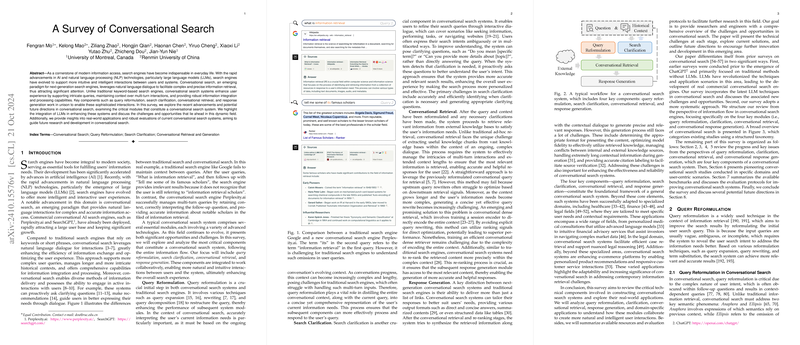A Survey of Conversational Search
This survey paper offers a comprehensive examination of conversational search, an emerging domain improving user interactions within search engines. Conversational search engines are distinct from traditional keyword-based systems as they leverage natural language dialogues and maintain context over multiple conversational turns. This survey provides insights into recent advancements and potential research directions, highlighting key modules such as query reformulation, search clarification, conversational retrieval, and response generation.
Key Components of Conversational Search
Query Reformulation: The paper describes query reformulation as essential for converting ambiguous, context-dependent queries into standalone representations. Methods include query expansion, query rewriting, and hybrid approaches that integrate LLMs to refine search intent and improve retrieval performance.
Search Clarification: Clarification involves interactive dialogue, where systems pose questions to refine user queries. This ensures precise understanding and accurate results. The paper discusses clarifying question selection and generation methods, demonstrating their impact on search clarity.
Conversational Retrieval: Retrieval within conversations involves understanding complex dialogues to extract relevant information. Techniques such as session encoding and context denoising address challenges in handling intricate conversations, ensuring relevant knowledge is retrieved.
Response Generation: Unlike traditional search engines, conversational systems generate dynamic responses, including direct answers and summaries. Effective response generation requires synthesizing retrieved content and managing extensive contextual information.
Performance and Evaluation
Evaluation of conversational search incorporates both retrieval-based and generation-based metrics. The development of datasets tailored for tasks like query reformulation and clarification supports empirical validation. Future research directions involve creating more comprehensive evaluation protocols that consider the intricacies of multi-turn interactions.
Applications and Future Directions
Conversational search extends to domain-specific applications such as healthcare, finance, and legal fields, where it tailors interactions to meet specialized user needs. Moreover, integrating domain-specific models enhances accuracy and relevance, especially with the deployment of LLMs.
Potential research directions suggest focusing on:
- Intelligent decision-making within multi-turn interactions.
- Faithful and abundant resource identification for richer responses.
- Proactive engagement and personalized content delivery.
- Development of practical evaluation frameworks emulating real-world scenarios.
Conclusion
The survey extensively covers the evolving landscape of conversational search systems, emphasizing their multifaceted nature and potential to transform user experience. It highlights the importance of leveraging LLMs and developing comprehensive evaluative measures to advance this burgeoning field.
